
Featuring career information from Codey Gerarden of Gerarden Fabrication & Design.
- Subject:
- Career and Technical Education
- Technology and Engineering
- Material Type:
- Other
- Author:
- NWTC
- CESA 8
- Date Added:
- 01/17/2023

Featuring career information from Codey Gerarden of Gerarden Fabrication & Design.

Join Danny Rubin, founder of Rubin, and Dr. Stephanie Lachman, a veteran school psychologist in Las Vegas, Nevada, about the in-demand role of a psychologist for students ages 3-21. This conversation covers the day-to-day life of a school psychologist, the importance of mental health professionals, the power of communication skills and more. Students and teachers should also make use of the webinar worksheet at https://rubineducation.com/wp-content/uploads/2022/12/Rubin-Dream-Job-Webinar-Worksheet-Psychologist-December-2022.docx
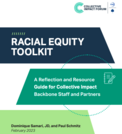
Centering equity is key to the purpose and mission of any collective impact work, no matter the issue area or focus. It is very difficult to move population or systems change without redressing disparities that exist in almost every community. Part of the challenge is there is not one path to achieve equity, and the work of advancing equity is an ongoing practice, built on work that is very personal, relational, and structural. Though it is a continuing journey without a definitive finish line, structured processes, goals, and metrics can support individuals and collectives to advance the work intentionally and strategically.

Featuring career information from Sandra Hanmann, Radiologist at Bellin Hospital.
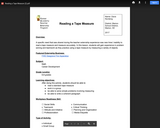
A specific need that was shared during the teacher externship experience was new hires’ inability to read a tape measure and measure accurately. In this lesson, students will gain experience in problem solving and teamwork as they practice using a tape measure by measuring a variety of objects.

Join Danny Rubin, founder of Rubin, and as he talks with Lety Pena, a real estate agent, and Colby Raymond, a mortgage lender, about the business of buying and selling houses.
Students and teachers should also make use of the webinar worksheet at https://rubineducation.com/wp-content/uploads/2021/04/Rubin-Webinar-Worksheet-Q-and-A-about-Real-Estate.docx

With the purpose of assisting Wisconsin middle and high school students to better understand the various aspects of Academic and Career Planning, CESA 10 has reached out to past graduates. Young professionals will share information about their chosen occupation, as well as career-related experiences during high school that were beneficial in discovering their own ACP journey.
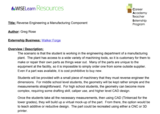
The scenario is that the student is working in the engineering department of a manufacturing plant. The plant has access to a wide variety of machining tools, so it is customary for them to make or repair their own parts as things wear out. Many of the parts are unique to the equipment at the facility, so it is impossible to simply order one from some outside supplier. Even if a part was available, it is cost prohibitive to buy new.
Students will be provided with a small piece of machinery that they must reverse engineer the dimensions. For middle school level students, the geometry will be kept rather simple and the measurements straightforward. For high school students, the geometry can become more complex, requiring some drafting skill, caliper use, and higher level CAD design.
Once the students take all the necessary measurements, then using CAD (Tinkercad for the lower grades), they will build up a virtual mock-up of the part. From there, the option would be to teach additive or reductive design. The part could be recreated using either a CNC or 3D printer.
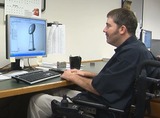
Featuring an interview with Brian VandenLangenberg, 2010 NEWMA AllStar from Robinson Metal in DePere(2:52 minutes).

Featuring an interview with Travis Knier, 2014 NEWMA AllStar from Rockline Industries in Sheboygan. (2:24 minutes)
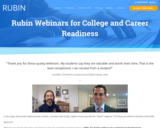
Follow this link to find FREE, live Rubin webinars for professional development.
During each Dream Job webinar, we hold a live conversation with professionals in a variety of CTE career pathways. The webinars teach students about nature of the job and the importance of employability skills for college and career readiness.
During our “summer PD” webinars, we do a deep dive into important CTE topics and provide hands-on lessons teachers can use in the classroom.
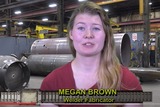
Featuring an interview with Megan Brown, 2020 NEWMA AllStar from Samuel Pressure Vessel Group (2:20 minutes)

Featuring an interview with Jeff Kubichek 2015 NEWMA AllStar from Sargento in Plymouth (2:56 minutes).

Check out these links to various STEM career resources that you can use as part of your classroom curriculum today.
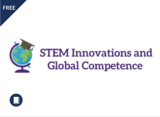
This course will focus on the intersection of STEM subjects and global competence and will feature a variety of resources, reflection activities, and testimonials from teachers across the United States. Global competence and global collaboration are essential to progress in the overlapping fields of science, technology, engineering, and mathematics (STEM). The interconnectedness of our world and the rise of new technologies demand that students be prepared to work across borders. To prepare for the jobs of tomorrow, students will need a set of specific skills that will enable them to fully participate, problem solve, and adapt in our changing world. The ability to engage with multiple perspectives in the pursuit of knowledge will be key to their success. Global competence in STEM requires today’s students to recognize their responsibilities to both the local and global communities and to develop and apply knowledge in culturally appropriate, relevant, and sustainable ways.
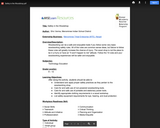
Woodworking can be a safe and enjoyable trade if you follow some very basic woodworking safety rules. All of the rules are common-sense ideas, but failure to follow these rules will greatly increase the chance of injury. The wood shop is not the place to be in a hurry or have an "it won't happen to me" attitude. Follow the 10 rules and your woodworking experiences will be safer and enjoyable.

Featuring career information from Nia Dubois, School Resource Officer for the Luxemburg-Casco School District

Many careers rely on Science-related skills. Specifically Science-related careers can also be found in the attached Career Cluster Chart.

You have already spent time looking at learning styles and determining which style allows you to learn best in different situations. Your learning style can’t tell you what classes you’ll get good grades in. And it sure doesn’t reflect your ability to learn. But there are lots of ways you can tap into your preferred learning style to help you when you’re studying or working in class. You may already have a good idea of what techniques work best for you.
In this Xello lesson, you will investigate visual, auditory, and tactile learning styles, and explore how understanding your own learning style can help you in school and on the job. Make SURE you have already taken the Learning Styles quiz in Xello before starting this lesson!

Have you ever heard the quote, “It’s not WHAT you know, it’s WHO you know?” Interacting with others to build relationships and exchange information is called networking. When you are searching for a job, you will probably explore job boards, professional social networks, and industry-approved accrediting associations. Networking with these communities can help lead to career opportunities.
In this Xello lesson, you will investigate job search strategies and research potential employers in your community.